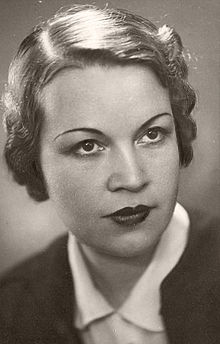music.wikisort.org - Poet
Elisaveta Bagryana (Bulgarian: Елисавета Багряна) (16 April, 1893 – 23 March, 1991), born Elisaveta Lyubomirova Belcheva (Bulgarian: Елисавета Любомирова Белчева), was a Bulgarian poet who wrote her first verses while living with her family in Veliko Tarnovo in 1907–08. She, along with Dora Gabe (1886–1983), is considered one of the "first ladies of Bulgarian women's literature". She was nominated for the Nobel Prize in Literature three times.[2]
Elisaveta Bagryana | |
|---|---|
 Elisaveta Bagryana (fragment from a photo, made before 1939). Source: Bulgarian Archives State Agency | |
| Born | Elisaveta Lyubomirova Belcheva 16 April 1893 Sofia, Bulgaria |
| Died | 23 March 1991 (aged 97) Sofia, Bulgaria |
| Resting place | Central Sofia Cemetery |
| Nationality | Bulgarian |
| Occupation | Poet, Translator[1] |
| Signature | |
 | |
Life

Elisaveta Lyubomirova Belcheva was born on April 16, 1893 in Sofia, Bulgaria in a clerk's family.[1] She finished her primary and secondary education in the capital city. She lived a year (1907-08) with her family in the town of Tarnovo, where she wrote her first poems.[1] Between 1910 and 1911 she taught in the village of Aftani, where she experienced rural life, after which she studied Slavic philology at Sofia University. Her first poems — Why (Защо) and Night Song (Вечерна песен) — were published in 1915 in the magazine Contemporary Thought (Съвременна мисъл).
It was after World War I ended that she truly entered into the literary world, at a time when poetry was undergoing a transformation. By 1921, she was already active in the literary life, and was collaborating on the Newspaper of the Woman (Вестник на жената) and the magazine Modernity (Съвременник), among other publications.
With the arrival of her first book, The Eternal and the Holy (Вечната и святата, 1927), she earned the confirmation of her peers. She also started writing children's stories. Her poems are straightforward, sensitive and serious, as in The Well (Кладенецът), a fable-like piece relating a well she dug when a little girl to the wellspring of poetry in her soul. They often are undeniably feminine – as in the poem The Eternal, in which the writer contemplates the body of a dead mother, or Evening Prayer – and spirited, as shown by the youthful, rebellious spirit in The Elements.

Bagryana passed her life surrounded by words, editing a number of magazines and writing. Her works have been translated into over 30 languages. Her poems are most recently available in a book entitled Penelope of the 21st Century: Selected poems of Elisaveta Bagryana, translated by Brenda Walker. She died in 1991, aged 97.[3]
Bagryana was a friend of communist activist Pétar Russév, father of Brazilian politician Dilma Rousseff, who won election as Brazil's first female President on 31 October 2010.[4]
Works in English
- Elisaveta Bagriana (1970). Kevin Ireland; Piotr Dinekov; Piotr Velchev (eds.). Ten Poems, in the Original and in an English. Sofia Press. Retrieved 21 August 2013.
- Penelope of the twentieth century: selected poems of Elisaveta Bagryana translators Brenda Walker, Belin Tonchev, Valentine Borrisov, Forest, 1993. ISBN 9781856100267
- Voices of Sibyls: Three Bulgarian Poets--Elisaveta Bagryana, Nevena Stefanova, Snezhina Slavova, Translator Yuri Vidov Karageorge, Morris Pub., 1996. ISBN 9781575021232
Awards and honours
- In 1943, 1944, and 1945 she was nominated for a Nobel Prize in literature.[2]
- In 1969, she won a gold medal from the National Association of Poets in Rome.
- Bagryana Point in Antarctica is named after Elisaveta Bagryana.
See also
- List of Bulgarian-language poets
References
- Цанева, М. (1994). "Багряна, Елисавета". Речник по нова българска литература (in Bulgarian) (first ed.). Sofia: Хемус ООД. pp. 21–22. ISBN 954-428-061-8.
- "Nomination Database". Retrieved May 27, 2016 – via Nobelprize.org.
- Detrez, Raymond (2010). The A to Z of Bulgaria. Lanham: Scarecrow Press. p. 36. ISBN 9780810872028.
- "ДИЛМА РУСЕФ Е ДЯСНАТА РЪКА НА ПРЕЗИДЕНТА ИГНАСИО ЛУЛА ДА СИЛВА ("President Ignacio Lula da Silva's right hand is Dilma Rousseff")" (in Bulgarian). www.aba.government.bg. Archived from the original on 2007-06-29.
External links
 Media related to Elisaveta Bagriana at Wikimedia Commons
Media related to Elisaveta Bagriana at Wikimedia Commons- Virtual library of Bulgarian literature online.
На других языках
[de] Elisaweta Bagrjana
Elisaweta Bagrjana (auch: Elisaveta; bulgarisch Елисавета Багряна; * 29. April 1893 in Sofia, Bulgarien, als Elisaweta Ljubomirowa Beltschewa, bulgarisch Елисавета Любомирова Белчева; † 24. März 1991 ebenda) war eine bulgarische Lyrikerin, die unter anderem Kinder- und musikalische Gedichte schrieb. Sie gilt als die erste bulgarische Dichterin, die in ihren Werken offen über ihre innigsten Gefühle als Frau sprach.[1]- [en] Elisaveta Bagryana
[es] Elisaveta Bagriana
Elisaveta Bagriana, en búlgaro: Елисавета Багряна, nacida Elisaveta Lyubomirova Belcheva (en búlgaro, Елисавета Любомирова Белчева Sofía, 16 de abril de 1893 - ibíd. 23 de marzo de 1991 ) fue una poetisa búlgara. Sus obras han sido traducidas a 30 lenguas diferentes.[fr] Elisaveta Bagriana
Elisaveta Bagriana (bulgare : Елисавета Багряна), née Elisaveta Lyubomirova Belcheva (bulgare : Елисавета Любомирова Белчева) le 16 avril 1893 à Sofia et morte le 23 mars 1991 (à 97 ans) à Sofia, est une poétesse bulgare.[ru] Багряна, Елисавета
Елисавета Багряна (болг. Елисавета Багряна, настоящее имя — Елисавета Любомирова Белчева; 29 апреля 1893, София — 23 марта 1991, там же) — болгарская поэтесса, переводчик, автор произведений для детей и юношества. Герой Народной Республики Болгария (1983). Лауреат Димитровской премии (1950).Другой контент может иметь иную лицензию. Перед использованием материалов сайта WikiSort.org внимательно изучите правила лицензирования конкретных элементов наполнения сайта.
WikiSort.org - проект по пересортировке и дополнению контента Википедии